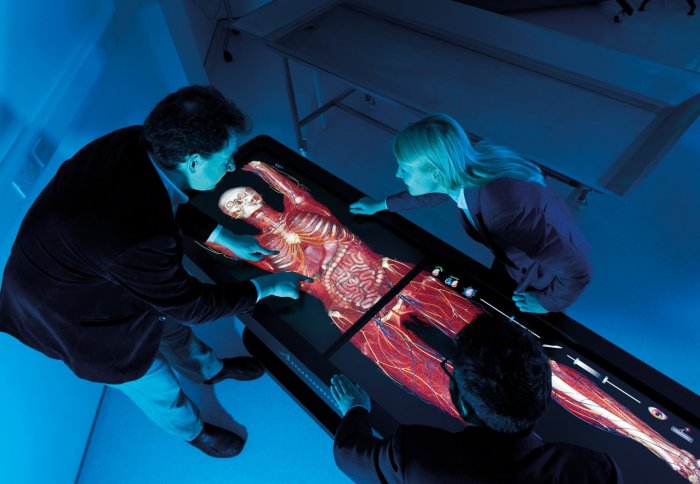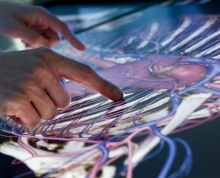Behind the scenes: Virtual dissections
by Sam Wong

Human dissections are a vital part of every doctor's training, but the experience might be different for medical students from the iPad generation.
Meet Melanie, a virtual cadaver that can be sliced and viewed from any angle on a touchscreen table.
 Based in the Department of Surgery and Cancer on the St Mary’s Campus, the table’s powerful rendering engine combines graphics and CT scans to produce a realistic image of a human body. Students can interact with the image by swiping a finger over the screen to rotate and slice the body or enlarge the view. Skin, organs, bones and blood vessels can be added or removed so the viewer can focus on whichever systems they want to look at.
Based in the Department of Surgery and Cancer on the St Mary’s Campus, the table’s powerful rendering engine combines graphics and CT scans to produce a realistic image of a human body. Students can interact with the image by swiping a finger over the screen to rotate and slice the body or enlarge the view. Skin, organs, bones and blood vessels can be added or removed so the viewer can focus on whichever systems they want to look at.
The table, made by US firm Anatomage, was bought for $60,000 in 2011, and is the first of its kind in Europe. Melanie has obvious advantages over a real cadaver. “With a body you can only dissect it once, whereas the table boots up and starts as many times as you want,” says Dr Philip Pratt of the Hamlyn Centre for Robotic Surgery, pictured to the left. Unfortunately for squeamish medical students, it won’t replace cadavers completely. Handling a real corpse is important for students to develop technical skills and professional attitudes.
Imperial researchers are exploring applications of the technology that go far beyond the teaching of anatomy. CT scans from a patient can be uploaded onto the table and displayed as an interactive 3D image, instead of the slices that doctors normally look at. Since the arrangement of blood vessels varies from person to person, this display is invaluable to surgeons when they have to clamp the vessels before removing part or all of an organ, such as a kidney.
This article first appeared in Imperial Magazine, Issue 38. You can view and download a whole copy of the magazine, from www.imperial.ac.uk/imperialmagazine.
Article text (excluding photos or graphics) © Imperial College London.
Photos and graphics subject to third party copyright used with permission or © Imperial College London.
Reporter
Sam Wong
School of Professional Development